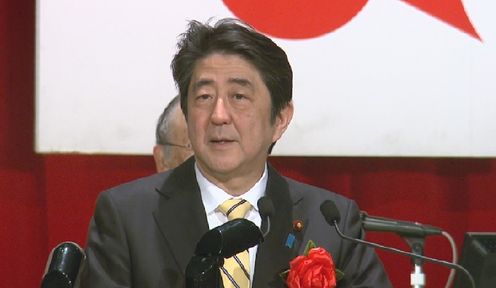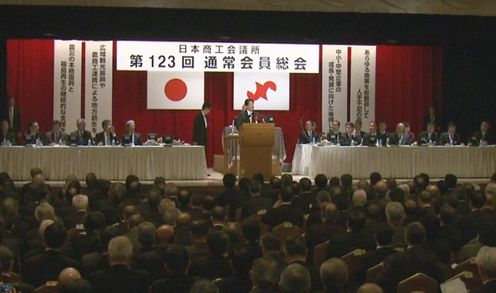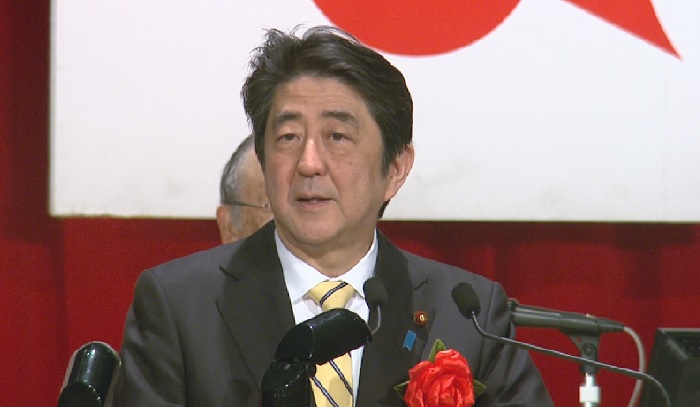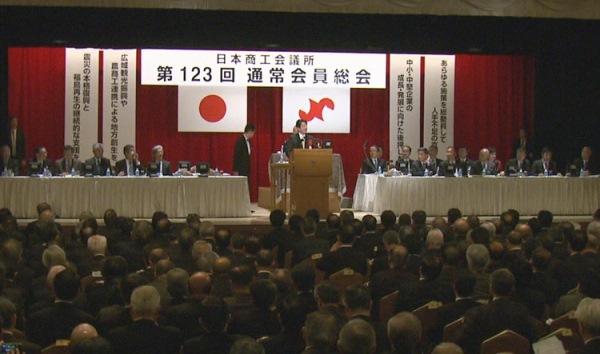Home > News > The Prime Minister in Action > March 2016 > The General Meeting of the Japan Chamber of Commerce and Industry
The Prime Minister in Action
The General Meeting of the Japan Chamber of Commerce and Industry
March 17, 2016

Photograph of the Prime Minister delivering an address (1)

Photograph of the Prime Minister delivering an address (2)
[Provisional Translation]
Prime Minister Shinzo Abe attended the 123rd General Meeting of the Japan Chamber of Commerce and Industry held in Tokyo.
The Prime Minister said in his address,
“Thank you very much for inviting me to today’s 123rd General Meeting.
Five years have passed since the Great East Japan Earthquake. To begin my address, I would like to once again offer my heartfelt condolences to the people who lost their lives during this disaster.
The earthquake and tsunami dealt a major blow to SMEs in the affected areas. A car repair shop in Ishinomaki City that had just opened 18 months earlier was completely swept away in the tsunami. During this time of need, the power of the network of chambers of commerce and industry across Japan was on full display.
Chambers of commerce and industry from across Japan gathered information from member companies about unused equipment that could be provided free of cost, and the necessary equipment for this car repair shop – a hydraulic press, a welder, and other equipment – was found and delivered free of cost. Once it had the necessary equipment, customers returned because people spread the news that the shop could repair vehicles right away by word of mouth. Until it ended last year, this program provided a lifeline to 3,300 SMEs in need, and acted as an intermediary so they could keep their business running. This fine-tuned assistance could not have been possible without members of chambers of commerce and industry who are closely connected to their own communities. I would like to express my appreciation to your significant contributions to the speedy recovery and reopening of businesses affected by the disaster.
Many people, however, still find themselves in a very precarious situation. Nevertheless, these peoples’ strong devotion to their hometown has provided a great deal of strength, which has helped to push the reconstruction process forward one step at a time. There can be no revitalization of Japan without the reconstruction of Tohoku. Based on this unwavering conviction, we will work toward creating a Tohoku that is overflowing with hope. Today, I have a renewed conviction toward this goal.
In May this year, I will serve as the Chair of the G7 Summit to be held at Ise-Shima. The global market is experiencing major change, with concern about the slowdown of the Chinese economy, the drop in oil prices, and so on. I believe that the current state of the global economy will be a major area of focus at the Summit. As the chair country of the G7 Summit, Japan will hold frank discussions with the leaders of various countries, and intends to transmit a clear message towards the sustainable, powerful growth of the global economy.
In order to properly fulfill Japan’s role as the chair country, we will listen to the views of experts regarding the state of the global economy and international finance, and conduct frank exchanges of opinions. For this reason, we have launched the International Finance and Economic Assessment Council. Just yesterday, this Council listened to the views of Professor Joseph E. Stiglitz, University Professor at Columbia University, and recipient of the Nobel Memorial Prize in Economic Sciences. I will be speaking with him again after this meeting here today, and next week I have called on Nobel Prize winner and Professor Paul Krugman to visit.
Through the ‘three arrows’ of Abenomics, we have created conditions in which we can say, ‘Japan is no longer in deflation.’ During this process, corporate earnings are at record highs. We have created over one million jobs and last year’s wage hike percentage was at its highest level in 17 years. This shows that positive economic cycles have been created.
Tax revenues have increased among all prefectural governments, while the ratio of job offers to job seekers has also increased, and bankruptcies of SMEs have fallen about 30% compared to before the Abe administration. A very bright future is now blossoming for both regions and SMEs.
However, I am well aware that many SME and small business owners have said that the benefits of Abenomics have yet to reach them.
Japan has reached the point where we are one breath away from exiting deflation. The key to solidifying these positive economic cycles is the ‘ignition of investment’ and the ‘third round of wage increases.’
To boost the profitability of SMEs, I have asked large corporations to comply with the government-labor-management agreement and work toward passing on costs based on rising procurement costs. The government has also conducted field audits on large corporations in accordance with the Act against Delay in Payment of Subcontract Proceeds, Etc. to Subcontractors .
We will conduct a large-scale investigation covering 25,000 companies regarding the progress of passing on price increases, to be completed by the end of this fiscal year. Once we have more detailed information about the current situation, we will enhance measures in place for subcontractors. I would like any increase in profits to be allocated toward new investment. Manufacturing subsidies will be used to aid the development of new products and other initiatives, not only in manufacturing, but in the service industry as well.
For example, an SME in Fukui City, with the cooperation of Osaka Medical College, has tackled the challenge of developing an artificial valve ring for preventing the backflow of blood into the heart by fixing a heart valve in place using thread that is highly compatible with living tissue. This SME completed a prototype with an adjustable ring size to accommodate patients ranging in age from infants to adults.
Capital investment to improve productivity will be supported through finance and a bold reduction in the fixed asset tax. This is why we submitted the ‘SME Version of the Bill for Strengthening Industrial Competitiveness’ to the current session of the Diet. Financially speaking, under the goal of ‘eliminating the practice of personal guarantees,’ Shoko Chukin Bank and the Japan Finance Corporation have executed more than 100,000 loans without personal guarantees over the past two years.
I believe many SMEs are not familiar with these assistance measures. Support offices in each prefecture are now working to provide information about these measures and offer advice concerning various management issues. If you have not done so already, I highly encourage you to visit one of these locations. These services are provided thoroughly in good faith and in a friendly manner. I ask that all of you take full advantage of these assistance measures and endeavor to invest in your facilities, technologies and people.
Yesterday was the main response date of the spring wage offensive. Many newspapers contained headlines about this occurrence, and it appears that the trend of wage increases from the previous two years is continuing. I ask that companies still in negotiations make every effort possible to fulfill the wage hikes towards the third round of Abenomics.
On March 8, the Cabinet approved a bill on the TPP and its implementation, and in turn we submitted this bill to the Diet. The TPP will result in an economic sphere covering 40% of the world’s economy using a shared set of 21st century rules. Ultimately, tariffs will be lifted on 99.9% of industrial products. The TPP will provide new growth opportunities for countless companies. Even if you do not export products yourself, if your own customers are involved in export, you will receive more orders.
When mid-sized companies looking to grow further and SMEs begin to export for the first time, many challenges await each step of the way, from planning to shipment. Therefore, last month we launched a framework in which chambers of commerce and industry, along with the assistance resources of various other relevant institutions can be used in tandem, including management consulting, product development and sales channel development. This mechanism is called the New Export Nation Consortium .
We will fully mobilize policies to ensure that mid-sized companies and SMEs can take full advantage of the new opportunities afforded by the TPP and to ensure regional revitalization.
Currently, the House of Councillors is deliberating the budget for the next fiscal year. I believe all of you are looking forward to the passing of this new budget. Based on the belief that passing the next fiscal year’s budget as quickly as possible is the greatest economic measure, it is with a sense of urgency that I am devoting my efforts toward ensuring the budget passes even one day sooner.
The Abe administration is now in its fourth year. I will dedicate all of my efforts to ensuring that SMEs and small businesses from every corner of Japan will be able to fully experience the economic recovery taking place. This year is a very important year for us all. Let us work together based on the understanding and support of the people to decisively move forward with measures, revitalize communities, and achieve regional growth, while fully sharing the policies needed to do so.
I would like to conclude my address by expressing my best wishes for the success and prosperity of Japan’s chambers of commerce and industry.”


